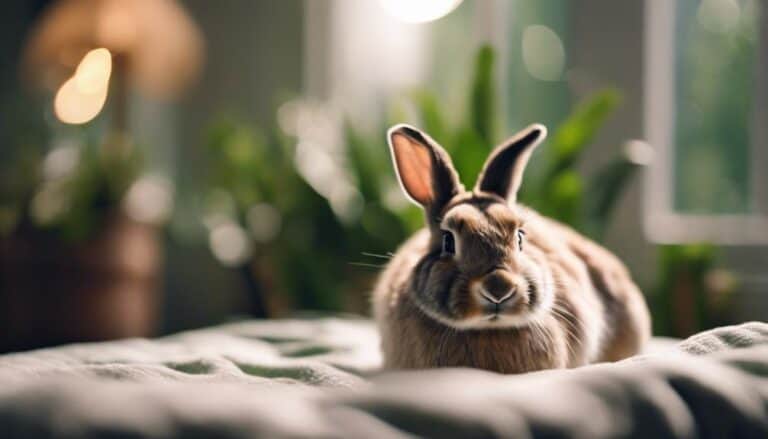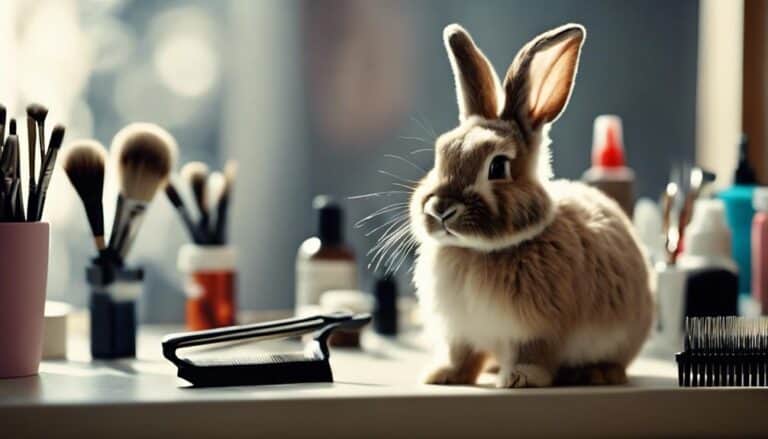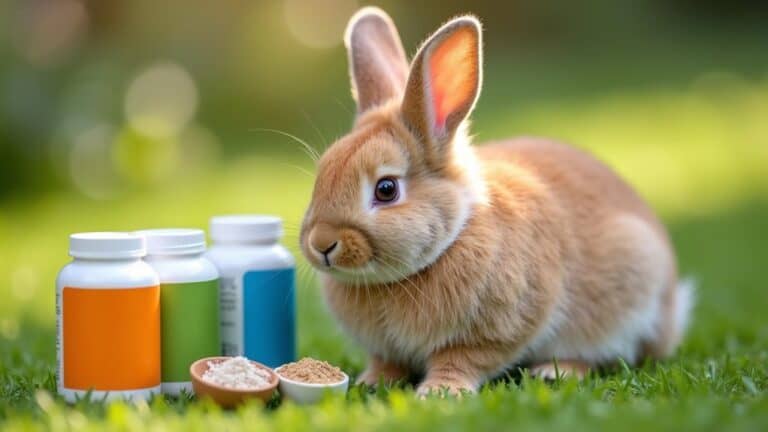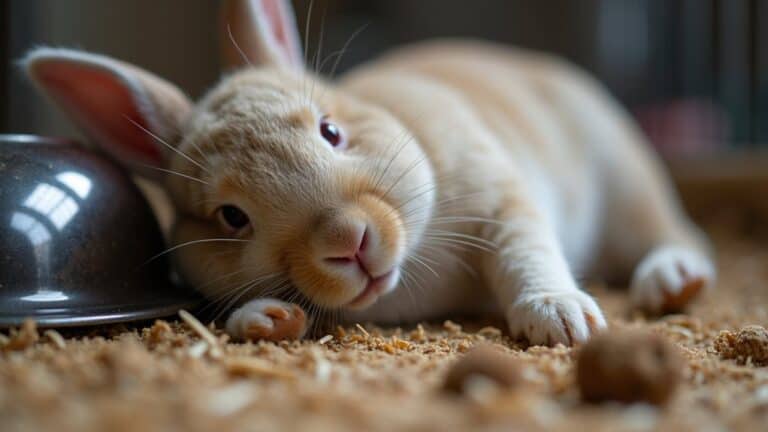As you consider the dietary needs of your senior rabbit, you'll find that adapting their nutrition plan becomes an essential element in ensuring their well-being. But how exactly does one navigate the intricate landscape of a senior rabbit's diet?
Let's explore the nuanced facets of feeding an aging bunny, from specialized dietary requirements to fostering a comfortable environment that promotes their health and longevity.
Discover the key components that make up a detailed guide to senior rabbit nutrition and care, providing you with the tools needed to support your furry companion in their golden years.
Contents
- 1 Key Takeaways
- 2 Identifying Senior Rabbits
- 3 Tailoring Diet for Aging Bunnies
- 4 Managing Common Health Concerns
- 5 Adjusting Housing for Senior Bunnies
- 6 Grooming and Hygiene Practices
- 7 Monitoring Weight and Nutrition
- 8 Importance of Vet Check-Ups
- 9 Ensuring Environmental Comfort
- 10 Are There Specific Dietary Requirements for Senior Rabbits?
- 11 Frequently Asked Questions
- 12 Conclusion
Key Takeaways
- Tailor diet to meet aging needs for optimal health and longevity.
- Monitor weight and adjust feeding to manage nutritional requirements.
- Provide nutrient-rich, fiber-filled diet to support digestion and overall well-being.
- Regular veterinary check-ups essential for early detection and tailored care planning.
Identifying Senior Rabbits
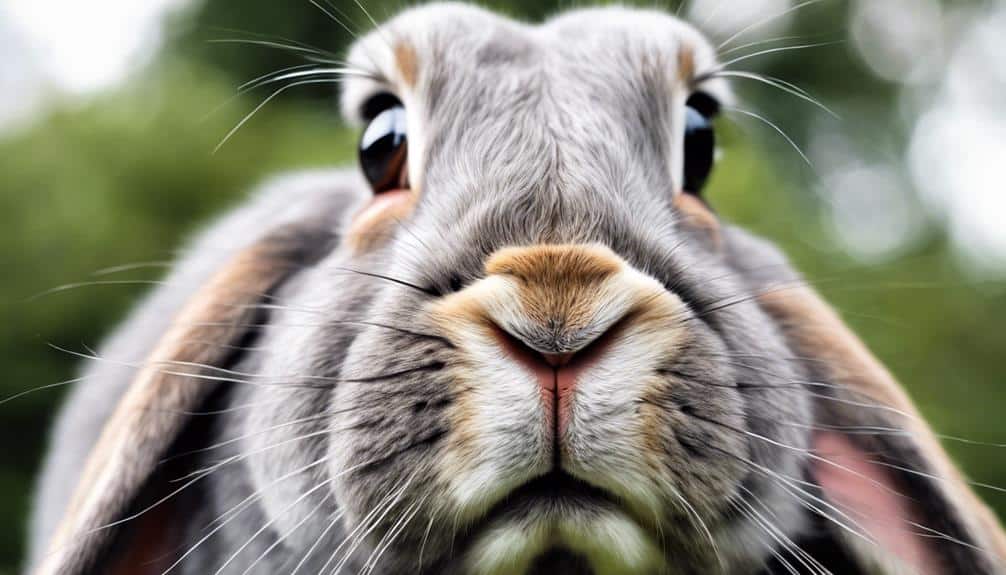
As a rabbit caregiver, recognizing the signs of aging in your senior rabbit is essential for providing tailored care and support. Senior rabbits, depending on their breed size, can be considered seniors as early as 4 years old for larger breeds and up to 8 years old for smaller breeds.
Aging can manifest in various physical signs like thinning fur, muscle and weight loss, decreased activity, scaling on ears, reduced climbing ability, and weakness. These signs are vital indicators that your rabbit may need specific attention and adjustments to their environment and care routine.
Understanding the specific needs of older rabbits is paramount to ensuring their overall well-being and quality of life. By being attentive to the signs of aging and addressing them promptly, you can help your senior rabbit navigate their later years comfortably and gracefully, enhancing their quality of life and ensuring they receive the best care possible.
Tailoring Diet for Aging Bunnies
As your bunny ages, you may need to adjust their diet to support their changing nutritional needs. Senior rabbits often benefit from a reduction in pellets to encourage more hay consumption, vital for their digestion and dental health.
Providing a variety of fresh veggies can help meet essential nutrient requirements for your aging bunny.
Senior Rabbit Food Changes
Tailoring the diet of aging bunnies involves making adjustments to accommodate changes in metabolism and nutrient absorption. When it comes to senior rabbit food changes, consider the following:
- Hay Emphasis: Increase the amount of hay to support digestive health and dental wear.
- Pellet Reduction: Decrease pellet intake to prevent obesity and allow for a more natural diet.
- Greens Selection: Provide softer vegetables and leafy greens to aid in digestion and nutrient absorption.
Nutrient Requirements for Seniors
When adapting the diet for senior rabbits, you must focus on meeting their specific nutrient requirements to support their overall health and well-being. Senior rabbits benefit from a diet rich in fiber to aid digestion and prevent gastrointestinal issues.
Adjusting pellet amounts is important to help them maintain a healthy weight and avoid obesity-related problems. As older rabbits may have dental issues, offering softer vegetables guarantees they can still receive essential nutrients.
Monitoring calcium levels in their diet is essential for preventing urinary tract problems. Hydration is key for aging rabbits, so always provide fresh water to support kidney function. By paying attention to these aspects of their diet, you can help your senior rabbits thrive in their golden years.
Feeding Frequency for Aging
To best care for your aging bunnies, make sure that food is readily available throughout the day to support their slower digestive system and encourage consistent nibbling. Here are essential points to take into account:
- Monitor Weight Changes: Keep a close eye on your senior rabbits' weight to adjust their feeding frequency accordingly.
- Tailor to Individual Needs: Every older rabbit is unique, so adjust their diet based on their specific requirements and preferences.
- Regular Monitoring: Continuously observe your aging bunnies' activity levels and appetite to make certain they're receiving adequate nutrition.
Managing Common Health Concerns
As your senior rabbit ages, you may notice common health concerns like arthritis, dental issues, and reproductive cancers.
To manage these conditions effectively, focus on dental care tips and weight management strategies to secure your bunny's well-being.
Dental Care Tips
Ensuring regular dental check-ups for your senior rabbit is vital to promptly detect any signs of dental disease and maintain their overall health and well-being.
Here are some dental care tips for your furry friend:
- Watch for Signs of Dental Disease: Keep an eye out for reduced appetite or difficulty eating, as these could indicate underlying dental issues.
- Provide Chew Toys and Hay: Offering chew toys and hay can help senior rabbits grind down their teeth naturally, promoting good dental health.
- Consult a Vet: If you notice any signs of pain or discomfort, consult a vet for proper dental care recommendations tailored to your senior rabbit's specific needs. It's crucial to address dental problems promptly to ensure your rabbit's well-being.
Weight Management Strategies
Implementing portion control and providing ample opportunities for exercise and mental stimulation are key components of effective weight management strategies for senior rabbits. Measure out the appropriate amount of pellets per day and limit high-calorie treats to help manage your rabbit's weight.
Encouraging regular exercise and offering puzzle toys can also support weight management efforts. Keep a close eye on your rabbit's food intake to prevent obesity, which can lead to various health issues. Consider consulting a vet for personalized weight management strategies tailored to your senior rabbit's specific needs.
Adjusting the diet by increasing hay and decreasing pellets can help promote a healthy weight and prevent obesity-related problems.
Adjusting Housing for Senior Bunnies
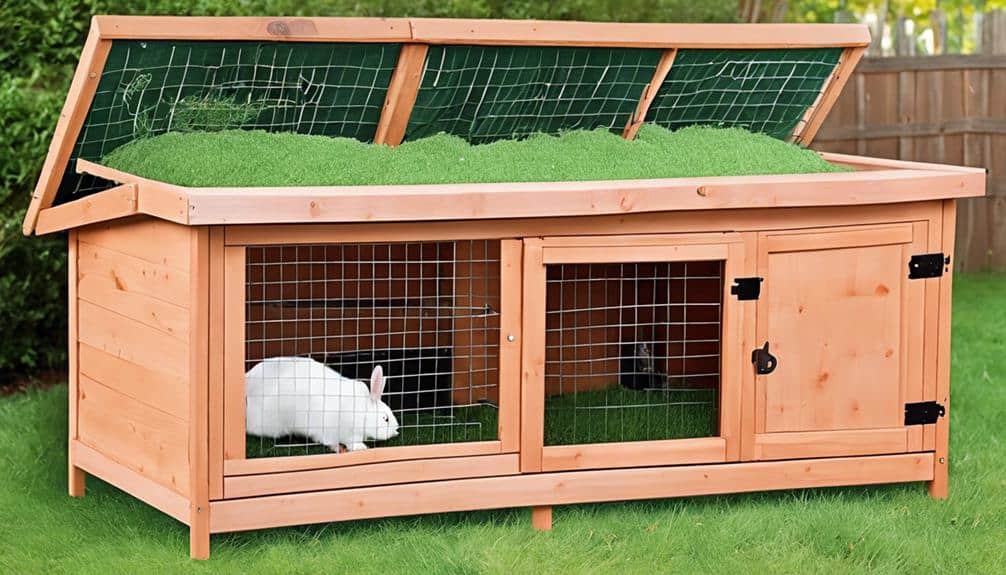
To cater to the evolving needs of your senior bunnies, consider making adjustments to their housing setup.
- Indoor Setup: Use rubber-backed mats and low-sided litter trays for indoor senior rabbits to prevent slips and falls. Providing plastic dog beds with easy access will allow your senior bunnies to rest comfortably indoors.
- Outdoor Environment: For outdoor senior rabbits, consider removing ramps in their hutch to accommodate any mobility issues they may face. This adjustment can make it easier for them to move around without obstacles.
- Comfort and Safety: Ensure a safe and comfortable environment by using thick, absorbent bedding to prevent pressure points and sores in senior rabbits. Choose appropriate flooring and create easy entry points to help them move around easily and feel secure in their space.
Making these housing adjustments can greatly improve the quality of life for your senior rabbits, making sure they remain comfortable, safe, and happy in their living environment.
Grooming and Hygiene Practices
Regular grooming and hygiene practices are essential for maintaining the health and well-being of your senior rabbits. As your bunnies age, they may need extra care to prevent issues like fur matting and skin problems.
Brushing your rabbit's coat regularly not only keeps it clean but also helps distribute natural oils and remove loose fur, promoting healthy skin and preventing matting. It's important to check your rabbit's nails frequently and trim them as needed to avoid overgrowth that can lead to discomfort or even health issues.
Monitoring your rabbit's teeth is also vital; look out for signs of overgrowth or dental problems that can impact their ability to eat properly. Additionally, cleaning your rabbit's ears gently with a damp cloth helps prevent wax buildup and reduces the risk of infections.
Monitoring Weight and Nutrition
As your senior rabbit's needs evolve, maintaining a healthy weight and balanced nutrition becomes a key aspect of their care. Here's how you can effectively monitor their weight and nutrition:
- Regular Weigh-Ins: Weigh your senior rabbit frequently to track any fluctuations. Sudden weight loss or gain could signal underlying health issues that need attention.
- Pellet Adjustment: Adjust the amount of pellets based on your rabbit's weight. This helps guarantee they receive the necessary nutrients for their age.
- Consultation with a Veterinarian: Consult with a veterinarian to determine the ideal weight range for your senior rabbit. They can provide valuable insights into tailoring a diet plan that suits your rabbit's specific needs.
Importance of Vet Check-Ups
For senior rabbits, prioritizing regular veterinary check-ups is fundamental in proactively managing their health and well-being. As your furry companion ages, their susceptibility to health issues increases, making these check-ups essential for early detection and treatment.
Elderly rabbits benefit from more frequent vet visits, ideally every 6 months, to monitor any changes in their health status effectively. Annual check-ups are also recommended for all rabbits to maintain their overall well-being and catch any potential problems early on.
Consulting a rabbit-savvy vet is vital for creating personalized care plans tailored to your senior rabbit's specific needs. These professionals can offer valuable insights and guidance, especially when considering significant changes to your rabbit's diet or care routines.
Ensuring Environmental Comfort
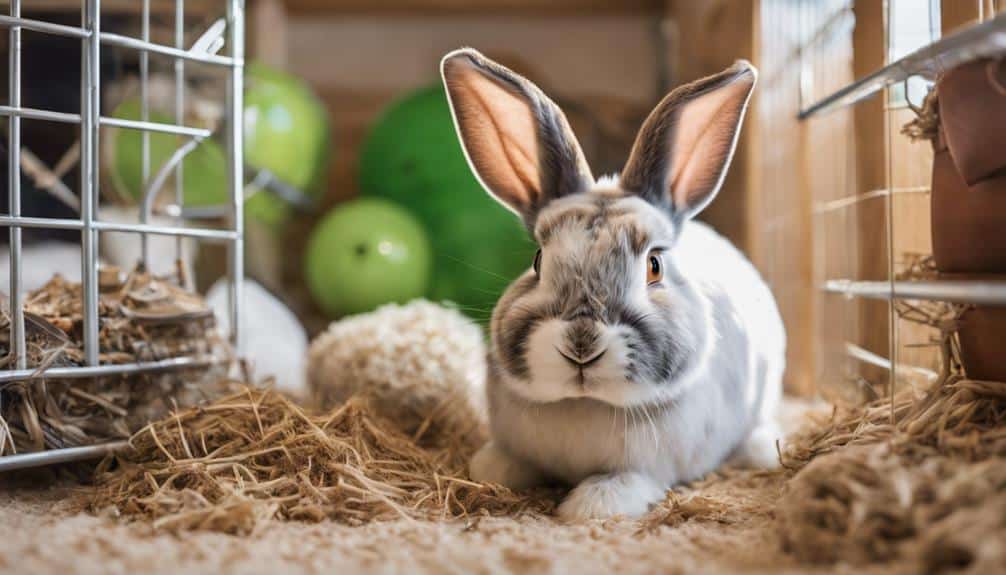
To guarantee your senior rabbit's comfort, consider providing appropriate environmental modifications tailored to their specific needs and age-related requirements.
- Ensure Proper Flooring: Place rugs or carpets in indoor areas where your rabbit roams to prevent slips and falls, offering them secure footing.
- Adjust Enclosures: Rearrange outdoor enclosures to eliminate ramps and obstacles, allowing easy movement for senior rabbits experiencing mobility challenges.
- Facilitate Access: Choose low-entry trays for litter boxes to make it effortless for your senior rabbit to access their bathroom area, reducing accidents and stress.
It's important to offer extra bedding in colder months to help your older rabbit stay warm and regulate their body temperature effectively. Additionally, make sure water, food, toys, hiding spots, and comfortable bedding are easily accessible to create a stress-free and cozy environment for your beloved senior rabbit.
Are There Specific Dietary Requirements for Senior Rabbits?
Yes, senior rabbits have specific dietary requirements that are different from younger rabbits. These elderly rabbit diets should be low in protein and high in fiber to support their aging digestive systems. It is essential to provide them with hay, leafy greens, and limited amounts of pellets to maintain their health as they age.
Frequently Asked Questions
What Is the Best Rabbit Food for Senior Rabbits?
For senior rabbits, the best food includes nutritional supplements, fresh veggies, occasional treats, and various hay types. These elements aid in digestive health, hydration, dental care, and exercise needs. Keep your furry friend happy and healthy!
How Much Pellets Should I Feed My Senior Rabbit?
You should feed your senior rabbit a moderate amount of pellets daily, ensuring they get a balanced diet rich in hay and fresh vegetables. Adjust pellet portions based on weight and consult a vet for best nutrition.
How Do You Help Senior Rabbits Gain Weight?
To help your senior rabbit gain weight, offer high-calorie treats, nutritional supplements, and quality hay. Establish a feeding schedule, incorporate exercise, monitor progress, and consult a veterinarian for personalized guidance on weight management.
What Age Is a Rabbit Considered Senior?
As rabbits age, their needs change. A small breed becomes a senior at 8, medium at 6, and large at 4. Understanding this helps tailor senior rabbit health, care, exercise, grooming, behavior, enrichment, vet visits, and companionship to meet specific needs.
Conclusion
As you journey through the golden years with your senior rabbit, remember to nourish their body and soul with love and care.
Just like a delicate flower, your aging bunny requires gentle attention and tailored nutrition to bloom brightly.
Keep their health in check, their home cozy, and their hearts full.
With a little patience and a lot of compassion, you can make sure your senior rabbit lives out their days in comfort and happiness.

